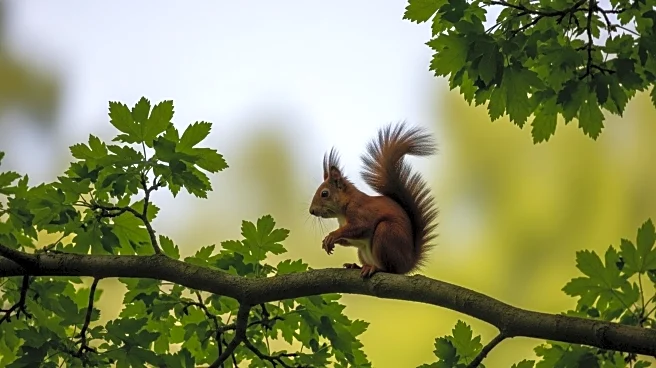What's Happening?
A study conducted by scientists at Bournemouth University has found that red squirrels in Europe exhibit resilience to climate change. The research utilized climate models to assess the species' ability to survive under various climate change scenarios. The study revealed that temperature fluctuations and reduced rainfall do not directly impact the survivability of red squirrels. Instead, factors such as habitat, food availability, disease, and competition with other species, notably the grey squirrel, have a more significant effect. The native red squirrel population in the UK has been largely diminished due to the introduction of grey squirrels from the US in the 19th century. Despite this, red squirrels continue to thrive in certain areas, such as the Isle of Wight, where geographical barriers prevent the encroachment of grey squirrels.
Why It's Important?
The findings of this study are significant for conservation efforts aimed at preserving red squirrel populations. Understanding that climate change does not directly threaten these animals allows conservationists to focus on other critical factors affecting their survival, such as habitat preservation and disease management. The resilience of red squirrels to climate change could serve as a model for other species facing similar environmental challenges. Additionally, the study highlights the importance of maintaining conservation efforts to protect red squirrels from the competitive pressures posed by grey squirrels, which carry the squirrelpox virus, fatal to red squirrels.
What's Next?
Conservationists may use the insights from this study to develop targeted strategies that address the primary threats to red squirrel populations, such as habitat loss and disease. Efforts could include enhancing habitat connectivity, controlling grey squirrel populations, and monitoring disease outbreaks. The study's findings may also prompt further research into the adaptability of other species to climate change, potentially influencing broader conservation policies.
Beyond the Headlines
The study underscores the complex interplay between climate change and biodiversity, suggesting that resilience to climate change may vary significantly among species. It also raises ethical considerations regarding the management of invasive species like the grey squirrel, which have a profound impact on native wildlife. Long-term conservation strategies may need to balance the protection of native species with the management of invasive ones.









